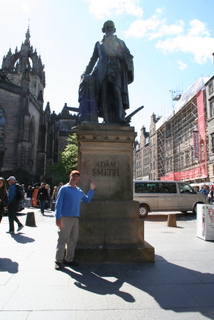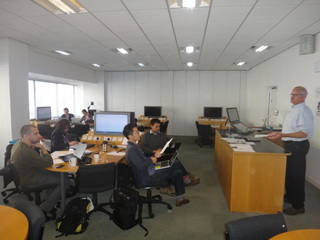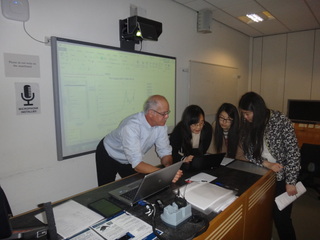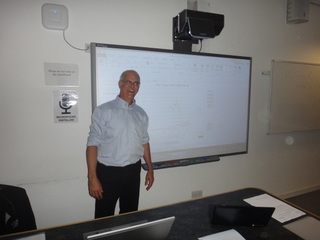2015 Workshop: Teaching Economics with Excel
This workshop was held from May 28 - 29, 2015 on at the University of Edinburgh in Scotland. I would like to deeply thank Dr. Sean Brocklebank for his help in supporting and enabling this event. The original description and schedule are below, after a few comments from participants and photos.
Participants
Unlike in previous years, I did not get insstitutional affiliation. All particpants were from Edinburgh and the surrounding area.
Angus Phimister
Siobhan Lucey
Diomedes Marroyiannis
Meng Zhang
Tiannan Li
Fraser Scott
Steven Vettraino
Olga Demyanova
Johannes Eigner
Sergii Kozik
Ryosuke Okada
Allen Thompson
Sulistiadi Dono Iskander
Axel Fougnen
Xiang Chai
Selection of Comments and Feedback Quoted from Evaluations
"The workshop is pretty brilliant."
"Really wish that I had these Solow Model workbooks when I was learning this model!"
"This is a great workshop. I will definitely include the Excel sheets at points in my teaching. This is somethintg I missed in my education where all that was needed to be understood was from analytical analysis."
"I would personally like to learn how to code the macros for the problems covered."
"You are a great presenter and did a solid work on making economics approachable to the undergraduate students. Excel is a useful tool."
"My favorite is the Monte Carlo part.:
"Fascinating."
"I will use this material."
Photos
Description
While the content of the typical undergraduate economics course has remained stable in recent decades, computers have become more powerful, easier to use, and as common as pencil and paper. In spite of these developments, teaching methods in the classroom remain virtually unchanged, with chalk-and-talk the dominant mode of delivery. This workshop will demonstrate how to utilize computer-based, active learning techniques to teach economics.
On the first day, we will work intensively with several Excel add-ins that have wide application, including: performing comparative statics analyses, running Monte Carlo simulations, downloading data directly into Excel from the St. Louis Fed's FRED database, and exploring long-run, global trends in real GDP per person with Maddison's World Economy data. The morning of the second day is devoted to microeconomic applications with prepared, macro-enabled workbooks on Consumer Theory (including classic examples such as food stamps and Giffen goods), firm cost-minimization and profit-maximization (with perfect competition, monopoly and duopoly), and partial and general equilibrium analyses of markets as resource allocation mechanisms. The afternoon session will focus on macroeconomics. A carefully constructed Excel implementation of the Solow Model enables clear explanation of sophisticated concepts such as the Golden Rule and how technological progress produces growth in the steady-state. Finally, a series of short-run, Keynesian models are built from the ground up, from a simple Keynesian Cross to an ISLM Model and an ISLMADAS Model.
This professional development will enable participants to create new course materials and content. Individual lectures, lab components, or entire courses can be reworked and enhanced, including flipping the classroom. Each day concludes with time for participants to explore workbooks and ideas on their own, with consultation if needed.
Dates and Location
May 28 - 29, 2015 on the mezzanine level at the University of Edinburgh's Appleton Tower Studio (M2A / M2B / M2C, Mezzanine Level).
We will begin on Thursday, May 28, 2015 at 10:00 AM and the second day's session will start at 9:00 AM. We will follow the schedule below.
Schedule
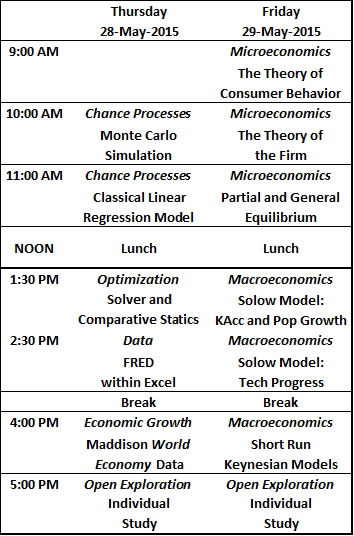
Previous Workshops
Click on a date below to see a list of participants, comments, photos, and a description of that year's workshop:
You can also view a map of all Econ Excel Workshop Home Institutions. Faculty from small liberal arts colleges to large state universities and a few international institutions have attended.
Bio
Dr. Barreto is interested in using computers (especially Microsoft Excel) to improve the teaching and learning of economics. He is the Elizabeth P. Allen Distinguished University Professor at DePauw University and author, with Frank M. Howland, of Introductory Econometrics using Monte Carlo Simulation with Microsoft Excel (Cambridge University Press, 2006) and Intermediate Microeconomics with Microsoft Excel (Cambridge University Press, 2009). He has been a Fulbright Scholar, won several teaching awards, and has presented the materials used in this workshop at many colleges and universities around the world. His current project is Teaching Macroeconomics with Excel.
Questions and Sign Up
Email hbarreto@depauw.edu if you have questions or would like further information. Participants will be accepted on a first-come-first-served basis.
To reserve a seat, please resgister at this Doodle sign-in page.
